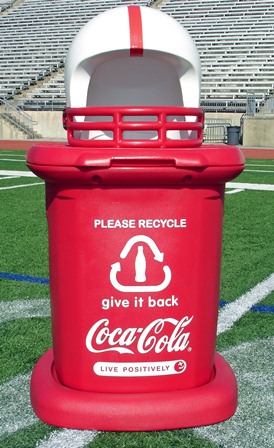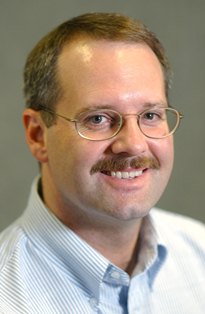Large college athletics departments talk the talk when it comes to concern for the environment and environmental sustainability, but only a small percentage of these departments actually walk the walk in making their operations “greener.”
It turns out there’s a large disconnect between athletics departments and other campus departments charged with advancing environmental sustainability, says Dr. Jonathan Casper, a North Carolina State University associate professor of sports management and lead author of a paper that examined athletic department sustainability practices at almost 100 NCAA Division I schools.
Concerns about the costs of going green, mixed with a lack of communication with the rest of the university about campus sustainability initiatives, appear to vex many green efforts in athletics, Casper says.
 He adds that some schools are capturing the “low-hanging fruit” – replacing incandescent light bulbs and utilizing recycling bins at stadiums, for instance – but says most haven’t included sustainable practices or long-term planning about environmental issues in athletics departments’ strategic plans.
He adds that some schools are capturing the “low-hanging fruit” – replacing incandescent light bulbs and utilizing recycling bins at stadiums, for instance – but says most haven’t included sustainable practices or long-term planning about environmental issues in athletics departments’ strategic plans.
The study, one of the first to examine sustainability in big-time college athletics, surveyed 117 so-called football bowl subdivision (FBS) schools; 97 schools responded to a number of questions on athletic department perceptions and actions on environmental sustainability. Generally, athletic department representatives responding to the survey understand that sustainability issues are important. But not many athletic departments have formal relationships with other campus groups involved in sustainability.
“Getting these groups talking to one another and partnering to make athletics more sustainable could really make a difference, as athletics departments understand the need to be greener in their building and facility operations, event management, and other areas,” Casper says. “Partnering with other campus groups already working on green initiatives may also help bring the cost down for athletics departments.”
For more information contact:
Dr. Jonathan Casper, NC State University Parks, Recreation & Tourism Management, 919/513-0771 or jmcasper@ncsu.edu
Mick Kulikowski, News Services, 919/515-8387 or mick_kulikowski@ncsu.edu
– kulikowsi –
Note: An abstract of the paper follows.
“Athletics Department Awareness and Action Regarding the Environment: A Study of NCAA Athletics Department Sustainability Practices”
Authors: Jonathan Casper, North Carolina State University; Michael Pfahl, Ohio University; Mark McSherry, ProGreenSports
Published: Jan, 27, 2012, in Journal of Sport Management
Abstract: The relationship of sport to sustainability management is relatively unknown. Despite the increasing recognition of the growing role of athletics in regard to environmental sustainability, it remains unclear what role athletics departments have with regard to environmental action and what is currently being done now. The purpose of this study is to examine American intercollegiate athletics department personnel in relation to their organization’s sustainability practices, organizational strategies, and personal perspectives at National Collegiate Athletic Association (NCAA) Football Bowl Subdivision (FBS) universities. Athletics department members (N = 97) who were most responsible for sustainability initiatives responded to a survey designed to assess awareness levels and concern for environmental issues and the strategies and practices at work in their respective athletics departments. Findings based on prioritization, planning, decision-making, and use of initiatives using frequencies and means are reported. Differences, using t-tests were also compared based on BCS or non-BCS standing. Results show that although environmental concern is high, there is disconnect between concern and action perhaps due to a lack of communication between the athletics department and the general university, cost concerns, and a lack of knowledge about sustainability initiatives. Implications related to the need for better communication between the athletics department/university and improved planning and prioritization is discussed.






